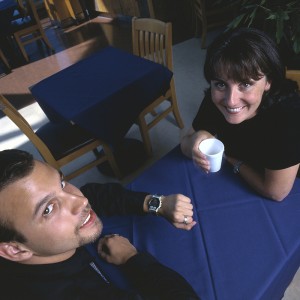Speed dating: Meeting new tech tools
 New tech tools appear at an astounding rate. (If TeachersFirst had a dollar for every flashcard maker, quiz maker, or memory jogger we have seen –and reviewed — in the past seven or eight years, we’d be taking the entire review team on a Mediterranean cruise this fall.) These days, many web tools are loss leaders to get us to buy the $2.99 app version — even when the web version is still free! Whether we meet up with new tools on old fashioned computers or on our tablets and mobile devices, these encounters feel more and more like speed dating. As teachers or edtech coaches, each of us has our own approach to our potential tech “dates.” Find your speed dating style here (or comment with another approach):
New tech tools appear at an astounding rate. (If TeachersFirst had a dollar for every flashcard maker, quiz maker, or memory jogger we have seen –and reviewed — in the past seven or eight years, we’d be taking the entire review team on a Mediterranean cruise this fall.) These days, many web tools are loss leaders to get us to buy the $2.99 app version — even when the web version is still free! Whether we meet up with new tools on old fashioned computers or on our tablets and mobile devices, these encounters feel more and more like speed dating. As teachers or edtech coaches, each of us has our own approach to our potential tech “dates.” Find your speed dating style here (or comment with another approach):
What do you do first when you see a new tool (or app)?
- Look for and actually read the step by step directions
- Watch the first 15 seconds of the intro video
- Join, play, and defeat it
- Try to use it in a way it was not intended
- Try to break it
- See how pretty it looks before proceeding
- Wonder how they coded it
- Name the seventeen others you know that are so similar it doesn’t matter
- Flip its purpose on its head
- Begin a sample called “test”
- Make and send a funny sample project to a friend
- Think of a lesson where you could use it
- Add it to today’s lesson plans
- Look to see how much “free” is inside its “freemium”
- Look for the teacher guide
- Look for standards correlations (really?)
- Look for Android/iOS app versions
- Read the terms of service
- Read the PRICING — first
- Look at all the examples to see what it is used for
- Check for obscene or inappropriate public examples and rule it out for school
- Walk away when it asks for your email
- Hypothesize how long it will last
- Wonder how long it will be before Google buys it up (or stomps it out)
As in speed dating, we each bring different expectations and seek different kinds of enjoyment from the encounter. What do enjoy most about these first encounters? (Some of these have scary analogies with dating)
- Figuring it out — and using it once
- Showing a friend
- Making someone laugh with it
- Comparing/contrasting it with similar tools
- Filing, bookmarking, or categorizing it
- Tweeting about it
- Laughing at the poorly translated English in the directions
- Matching it to tasks you do or need to do
- Adding it to your collection
- “Pinning” it
- Pondering whether it could be “the One” to change your life
Next time you face a new tool (probably sometime today), stop to think about your approach. Ask your students how they “meet up” with new tools. The conversations you may have about digital life could be pretty intriguing and branch into good discussions about digital citizenship and the role of technology in our lives.




I think this would be a fascinating conversation to have with people of all ages — especially on the use of video and media on the web. I know a lot of people who skip right over demo videos. And at the same time, I know people who watch demo videos instead of reading the sales pages. It’s truly amazing.
Comment by Michael at QuizBean — September 10, 2013 @ 10:22 am